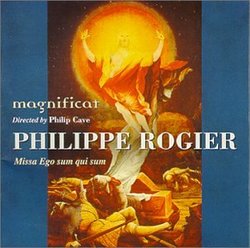| All Artists: Nicolas Gombert, Philippe Rogier, Carolyn Sampson, Matthew Beale, Tom Raskin Title: Rogier: Missa Ego sum qui sum Members Wishing: 0 Total Copies: 0 Label: Linn Records Original Release Date: 1/1/2000 Re-Release Date: 2/15/2000 Genres: Special Interest, Classical Styles: Opera & Classical Vocal, Chamber Music, Historical Periods, Classical (c.1770-1830) Number of Discs: 1 SwapaCD Credits: 1 UPC: 723723757722 |
Search - Nicolas Gombert, Philippe Rogier, Carolyn Sampson :: Rogier: Missa Ego sum qui sum
 | Nicolas Gombert, Philippe Rogier, Carolyn Sampson Rogier: Missa Ego sum qui sum Genres: Special Interest, Classical
|
Larger Image |
CD Details |
CD ReviewsWonderful discovery of Spanish polyphony... PMC | West Hartford, CT | 05/03/2000 (5 out of 5 stars) "I already own Magnificat's recording of Victoria's Requiem, to my mind the best available, so I was excited to learn of this new release. Philippe Rogier (probably unkown to many these days) was originally from Flanders, but travelled to the Spanish court as a choirboy at age 10, and stayed there for the remainder of his working life. Much of his music was destroyed in an 18th c. earthquake, and if this disc is anything to go by, that is a great tragedy. The disc contains a mass and motets, all of which reveal Rogier as an exceptional composer. He crafts flowing melodic lines, supported by harmonic textures that are significantly more interesting (and involved) than many of his contemporaries. The music is deeply satisfying, both emotionally and intellectually, and suggests that Rogier should indeed become better-known.Magnificat, as with their Victoria CD, does the music great justice. Philip Cave is an intelligent and sensitive conductor, bringing out all the drama and passion of these works in his exquisite phrasing. The choir's sound is warm and full, their performance entirely in touch with the music's soul (a feature often lacking in certain other English choirs). If you enjoy Renaissance music, you should definitely buy this cd - and give it to all your friends!" Heavy Baton Giordano Bruno | Wherever I am, I am. | 04/17/2008 (3 out of 5 stars) "Polyphony shouldn't sound conducted. Not Franco-Flemish polyphony of the 16th Century, anyway. Each vocal line should move independently, accenting notes according to its own rhetorical logic, seeming to arrive in accord at cadences almost by chance. Each line is its own sentence. If you feel your foot itching to tap, it's gone wrong. Renaissance polyphony was notated without barlines in part books rather than open score. A conductor really should be seen (by the choristers) but not heard (by you).
The opposite is true in this earnest effort by the young English conservatory graduates who make up Philip Cave's ensemble Maginficat. Not only is the tempo uniform from motet to motet but Cave's baton can be "heard" like the thump of an old tire on a concrete motorway. It's a fatal mistake, but there are other problems. The tenors have those clear English choirboy voices, but they overmatch the basses and cover the altos like a Dickensian fog. The sound engineering doesn't help. There's a nasty white noise edge to any swelling passage, and somehow the voices don't sound entirely relaxed and human. It's a pity, since recordings of Philip Rogier are hardly numerous. The mass EGO SUM QUI SUM, beginning with the fifth track, finally achieves redeeming energy and polyphonic horizontality, as if the conductor finally sat down and let his choristers sing. That half of the performance is well worth the price of the CD, if you don't mind fast-forwarding." |

 Track Listings (12) - Disc #1
Track Listings (12) - Disc #1